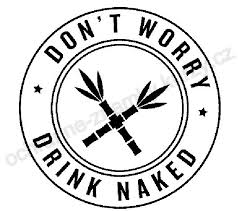 In a recent opinion issued by the Trademark Trial and Appeal Board, Applicants sought to register DRINK IT NAKED (in standard characters) on the Principal Register for Tequila in International Class 33. In re Castaneda and Anderson, Serial No. 85876309 (January 13, 2016) [not precedential]. The Trademark Examining Attorney originally refused registration of Applicants’ mark under Section 2(d) of the Trademark Act, 15 U.S.C. § 2(d), on the ground that Applicants’ mark resembled a previously registered mark, DON’T WORRY DRINK NAKED, and design for distilled spirits in International Class 33 and was likely to cause confusion, mistake, or to deceive purchasers. Id. at 2. Applicant appealed after Examining Attorney made the refusal final.
In a recent opinion issued by the Trademark Trial and Appeal Board, Applicants sought to register DRINK IT NAKED (in standard characters) on the Principal Register for Tequila in International Class 33. In re Castaneda and Anderson, Serial No. 85876309 (January 13, 2016) [not precedential]. The Trademark Examining Attorney originally refused registration of Applicants’ mark under Section 2(d) of the Trademark Act, 15 U.S.C. § 2(d), on the ground that Applicants’ mark resembled a previously registered mark, DON’T WORRY DRINK NAKED, and design for distilled spirits in International Class 33 and was likely to cause confusion, mistake, or to deceive purchasers. Id. at 2. Applicant appealed after Examining Attorney made the refusal final.
The Board first looked to the relatedness of the goods, channels of trade, and classes of purchasers. In doing so, the Board noted that Applicants sought registration of a mark for “tequila” whereas the registered mark was for “distilled spirits.” In examining the definition of a “spirit,” the Board unsurprisingly concluded that “[t]equila is one such distilled spirit . . .” and that “distilled spirits” in the cited registration “subsume the more narrowly identified ‘tequila’ in the involved application.” Id. at 4. Alas, the Board easily found the goods to be legally identical, which Applicants did not dispute.
As a result, the Board presumed that the goods travel in the same channels of trade and were available to the same potential purchasers of such goods. Id. Since neither Applicants nor Registrant sought to further limit the goods to a particular channel of trade or classes or purchasers, the Board further presumed that the goods move “in all channels of trade normal for those goods, and that they are available to all classes of purchasers of the goods, which in this case are ordinary consumers.” Thus, the Board found the second and third du Pont factors weighed heavily in regard to finding a likelihood of consumer confusion. Id. at 5.
The Board then moved on to the similarity of the marks, focusing on the similarity or dissimilarity of the marks in their entireties as to appearance, sound, connotation, and commercial impression. In doing so, the Board noted that Applicants’ mark creates “an overall commercial impression that is similar to Registrant’s composite mark: [image of Registrant’s mark].” Id. at 7. The Board noted that the fact that Registrant’s mark contained patterns and stars did not “obviate” the confusion between the two marks, emphasizing that the crossed sugarcanes were in some way a reference to a raw ingredient commonly found in distilled spirits. Id. “[T]he literal portion of Registrant’s mark is far more likely to be impressed upon a purchaser’s memory and to be used when requesting the goods than is the sugarcane design . . . .” Id. at 8.
Applicants proceeded to argue that the marks were sufficiently different in connotation to avoid confusion, contending that, “consumers would perceive the term ‘naked’ in Applicants’ mark as referring to a tequila beverage that did not contain any drink mixers or added juices [and] they would perceive the term ‘naked’ in the registered mark as being unclothed.” Id. Not surprisingly, the Board found this argument unpersuasive, reasoning that the phrase “drink naked” may propose an image of a person consuming alcohol unclothed, but there was “no reason why the phrase ‘drink it naked’ could not also evoke such an image, and there is nothing in the record to support Applicants’ contention that ‘drink it naked’ refers to their goods rather than the consumers thereof.” Id. at 8–9. The Board recognized that “drink it naked” could be interpreted to either be a beverage without mixers or juice, but it could also be perceived as a proposal to undress.
The Board found the marks were similar in their connotations and commercial impressions and more similar than dissimilar with respect to their entireties as to appearance and pronunciation, in additional to the identicalness of the goods and the trade channels. Thus the Board found in favor of a likelihood of confusion and affirmed the Examining Attorney’s prior refusal to register Applicants’ mark.
For more information on wine or alcohol law, or trademarks, please contact Lindsey Zahn.
DISCLAIMER: This blog post is for general information purposes only, is not intended to constitute legal advice, and no attorney-client relationship results. Please consult your own attorney for legal advice.